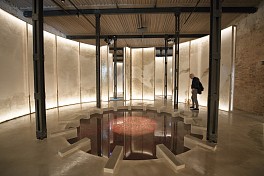BIOGRAPHY

BRICKLAB Profile
Abdulrahman & Turki Gazzaz are Jeddah based architects whose work explores the boundaries between art, material research, and the built environment. Abdulrahman graduated from the University of the West of England in Bristol with a Bachelor’s degree in Architecture and Planning in 2012. Turki completed a Master’s degree in History and Theory of Architecture from McGill University in Montreal in 2011.
Their respective studies have cemented their attachment to the field of architecture, leading them in 2015 to found Bricklab, an interdisciplinary design studio located in Jeddah. Their projects range from public space interventions, installations, retail, and housing as well as to deepen the research aspect of each project and offer contributions with new dimensions for specific social, economic and political contexts. In 2018, Bricklab designed the inaugural Pavilion of Saudi Arabia titled “Spaces in Between” at the 16th Venice Architecture Biennale. Their work was exhibited in 21,39 Jeddah Arts, Al Serkal Avenue during Dubai Art Week, and Salone del Mobile in Milan. And are curators of 2019’s edition of 2139, The Saudi Art Council’s PUBLIC/PRIVATE edition.
Straddling art and architecture, the Gazzaz brothers have additionally worked in the exhibition scenography for the 2018 edition of 21,39, the yearly Saudi Art Council-sponsored art event in Jeddah, where they transformed the traditional house of Rabat Khunji in Al Balad, in the Old Town of the city, into an installation mixing infrastructure and plant life, reflecting on the presence of nature within the built environment.
Statement
At Bricklab, ‘site’, ‘object’, and ‘users’ are understood as dynamic elements that shape our physical world. We endeavour to fill the gaps between graphics, product design, interiors, and architecture and understand these different disciplines as articulations of human thoughts and desires. Perceived perhaps as digressions or hyphens, we appreciate as poetic gestures of space, as necessary openings of structures.
Our diverse background in architecture, planning, and history/theory frames our attitude towards practice. As such, we focus on developing a particular research question with every project to allow us to make meaningful contributions for any given socio-political and economic context and reshaping them as personal contributions of understanding offered back to the public.



